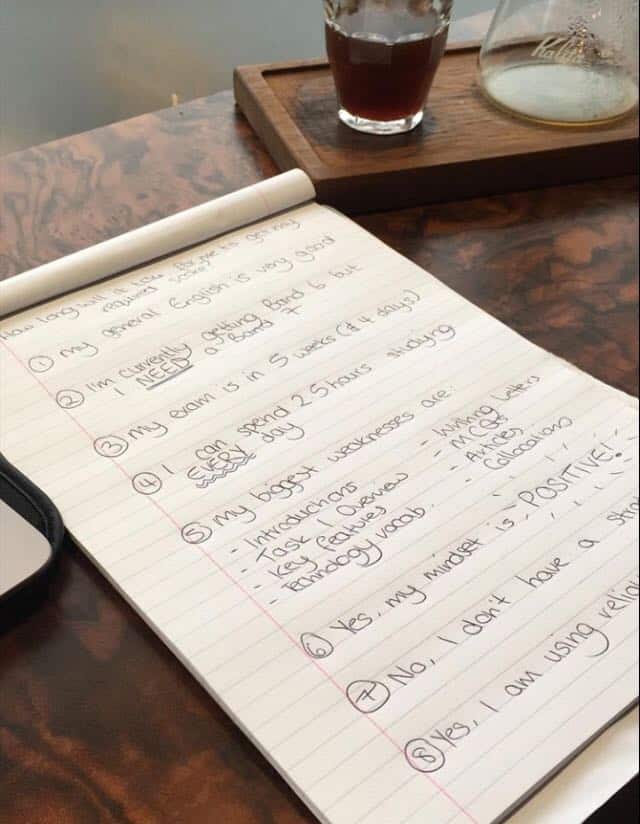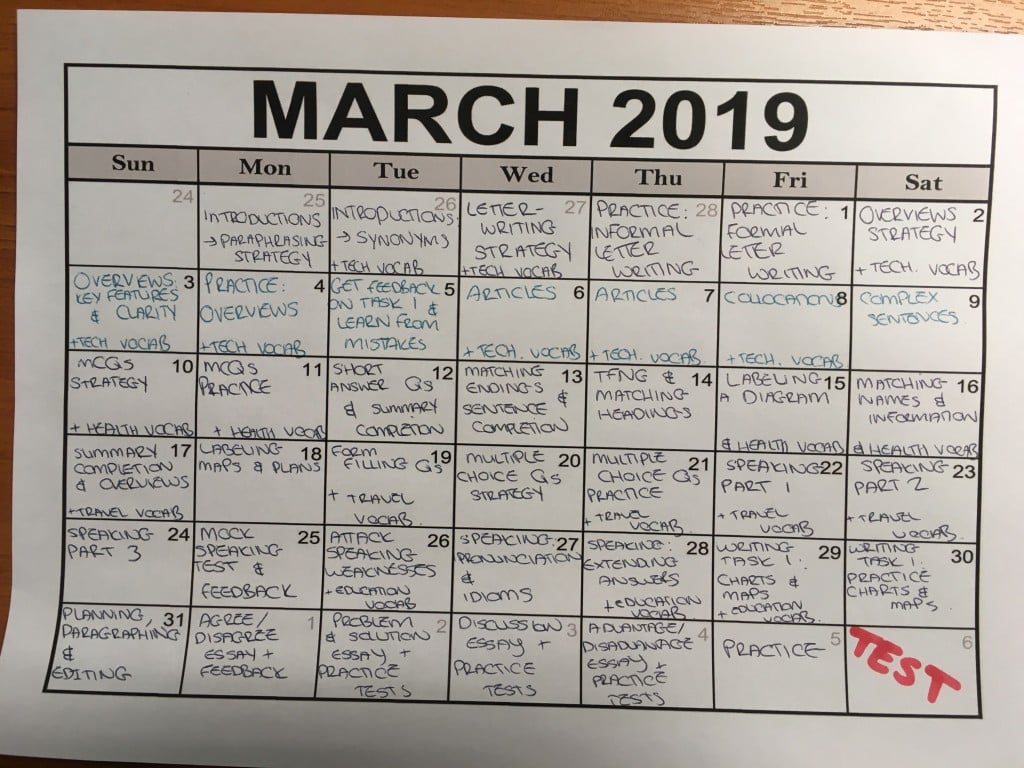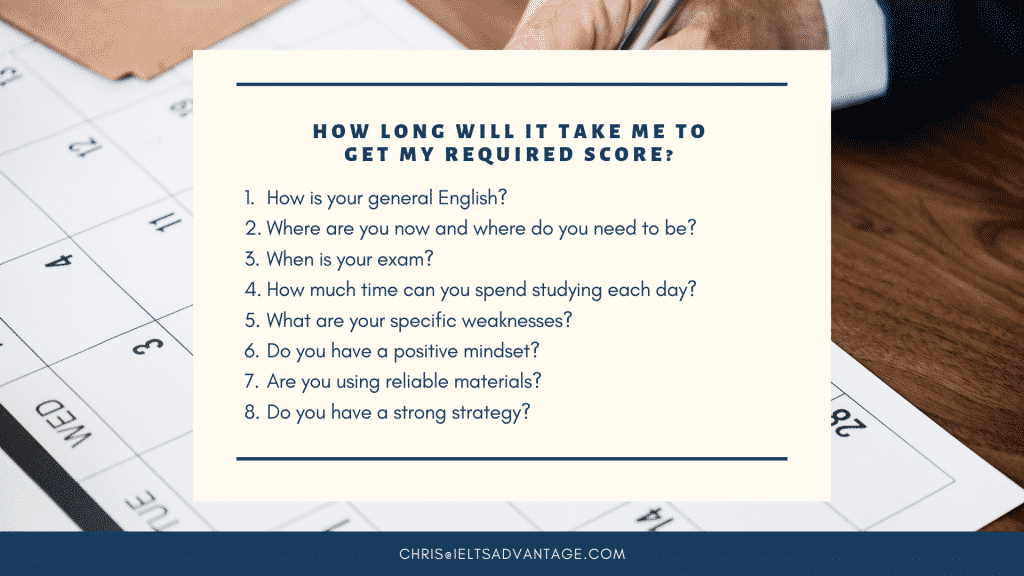Do you need to prepare for the IELTS exam but have no idea how long it will take you? Perhaps you fear that you’re running out of time before your exam?
This article will help you determine the amount of time you should spend preparing for your IELTS exam and outline exactly how you can implement your plan of action.
But before we begin, I want you to imagine a scenario for me…
***
Imagine that you have been feeling sick for some time and need to get better.
You don’t know what the problem is.
You’ve posted questions on Facebook, watched videos on YouTube, but there is so much conflicting and confusing information available that you can’t find the answer anywhere!
So you finally decide that it’s time to see a professional.
When the day arrives, you walk into the doctor’s office, take a seat and ask:
‘Doctor, how long will it take for me to get better?’
In reality, the doctor will always reply:
‘That depends – I need to know what’s wrong, first!’
***
The exact same principle also applies to IELTS preparation.
No IELTS expert can tell you how long it will take to achieve your desired score if they don’t know anything about you.
Below, I will list 8 questions you MUST ask yourself if you wish to determine how long it will take you to prepare for the IELTS exam:
Give yourself the time to think about these questions and then record your answers on a blank sheet of paper or document. It’s important that you complete this task because your answers will indicate how much work you have left to do. This should only take around ten minutes or so. I’ll include an example answer sheet below:
Now what?
Once you have recorded your answers, you should review and annotate them. Unfortunately, I can’t do this for you!
You will need to look for ‘telltale signs’ that indicate how much time you will need to spend studying. For example, if you answered ‘NO’ to questions 6-8, it is likely that you should factor in extra time to do some research.
You can use the key below to determine how much time you will need to get your required score:
How is your general English?
Answer this one honestly. There is no shame in saying ‘my general English isn’t great’!
However, you should know that your general English skills will impact the time it takes for you to prepare for the IELTS exam.
If your general English is weak, you will need to learn the rules behind grammar, vocabulary and pronunciation, all of which require TIME and practice to improve.
If your general English is strong, your main focus will be improving your exam skills, which will require far LESS TIME.
Where are you now and where do you need to be?
Another way to phrase this question is: What is your current band score and what is your required band score?
The larger the gap between your current and required scores, the MORE TIME it will take you to prepare for your test.
When is your exam?
If you have already booked your test, it’s important that you are realistic with your expectations. For example, expecting to complete your preparation in just one month will damage both your confidence and your perception of the IELTS exam. The IELTS exam isn’t difficult if you know what you’re doing!
If you haven’t booked your test yet – GOOD! You are in a very favourable position. My advice to you would be to set a realistic deadline by which you should complete your studies. Once you hit this deadline, you must ask yourself – ‘Am I confident that I can get the score I need?’ If the answer is ‘no’ then you should spend more time preparing.
How much time can you spend studying each day?
This will impact the overall amount of time it will take you to complete your IELTS preparation. For example, an individual that can spare 4 hours of study per day will achieve their IELTS goals in a much SHORTER PERIOD OF TIME than a student that can only study for 30 minutes a day.
What are your specific weaknesses?
Remember: weaknesses are specific reasons that prevent you from getting the score you need. It’s up to you to identify your individual weaknesses so that you can tackle and improve them in time for your exam.
This will both speed up the preparation process AND make it more effective.
If you have lots of weak areas, you will need to spend MORE TIME preparing for your IELTS exam.
I would recommend prioritising your weaknesses in order of the most difficult. Ranking each area of difficulty will help you determine the areas that you should spend the most time on.
Do you have a positive mindset?
A positive mindset is more than just ‘looking on the bright side’.
In my experience, the pupils that achieve their required score the QUICKEST are the ones that view criticism as constructive, feedback as valuable and mistakes as opportunities to improve.
Are you using reliable materials?
I speak about the importance of using reliable materials constantly. The reason for this is simple: there is nothing more frustrating than seeing a student’s progress handicapped because they depend on poor quality materials with inaccurate information or misleading advice.
Using reliable materials will help you achieve your IELTS goals much QUICKER.
Watch this video lesson for some advice on finding reliable IELTS materials.
Do you have a strong strategy?
It’s important to be strategic while preparing for your IELTS exam; many IELTS students waste their valuable TIME searching for ‘tips’, ‘tricks’ and ‘secrets’ that they think will boost their score.
Unfortunately, the only thing that will improve your score is hard work!
***
Once you’ve determined how long it should take you to get your required score, you need to make a plan of action. You might also know this as a study plan or a revision schedule.
In my experience, the best way of creating a study plan is by using your answers from the questions above. This information can essentially be transferred into a study plan.
Below I have drawn out a sample study plan based on the sample answer sheet I provided above.
NOTE: this study plan is just an example and is not suitable for your own use. It’s important that your action plan suits your needs and weaknesses. I found the template by Google searching ‘March calendar 2019’ – you can do the same, draw out your own or use the calendar on your phone. Whatever works best for you.
By comparing the sample answer sheet with the timetable above, you will notice that:
- The answer sheet told me that I had 5 weeks and 4 days before my exam. Therefore, I scheduled IELTS preparation into my calendar for every single day until the test. This might not seem realistic, but it’s important that you don’t miss a day, even if you begin by studying for just a small amount of time. You can gradually increase the time slot, the most important thing is that you’re always moving forward with your progress.
- The study plan I made begins with the specific areas of weakness that were outlined on my answer sheet. This tactic is beneficial for many students, as it prevents them from being overwhelmed when their exam nears, as it means they can revise material they’re comfortable with instead of trying to learn a new and difficult topic.
- One of the weaknesses written on my answer sheet was vocabulary. To address this, I incorporated regular slots of time throughout the week dedicated to vocabulary, as it isn’t a weakness that can be fixed overnight. These sessions should never consist of reading through a dictionary or memorising a long list of words, as there are plenty of ways to enjoy widening your vocab range. You can read about them and watch this youtube video we made.
- Note that my study plan includes slots of time dedicated to engaging with and learning from feedback. This is an incredibly important part of IELTS preparation, as gaining feedback from an IELTS professional is the most reliable form of identifying your weaknesses and monitoring your progress.
- Finally, don’t skip anything. If you don’t complete a topic in the time you allowed yourself to complete it, return to and finish it. Trust me, you don’t want to take the risk of ‘hoping’ that a certain topic or question type won’t appear.
If you do take part in this activity, make sure to let me know how it goes. You can either let me know in the comments below or send me an email at chris@ieltsadvantage.com.
Alternatively, if you’re wondering whether it is worth the time or effort to create a study plan, you should watch Daniela’s story below. She struggled to get the help she needed to improve her writing before following the structure of our VIP Course. She then studied the modules every day, submitted her writing and learned from her feedback before getting the score she needed in the time she had available – a band 7 in just 2 weeks.






